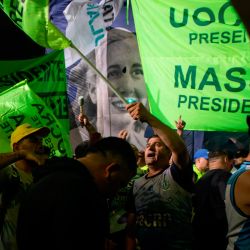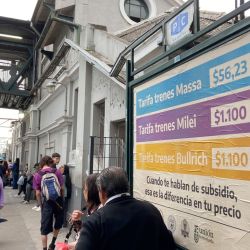Javier Milei truly believed he would celebrate turning 53 by winning Argentina’s Presidency in the first round. The ballroom in a traditional yet démodé hotel in downtown Buenos Aires was thrumming to club beats and glowing in his signature campaign purple. Guests had been flown from around the world to toast the upset.
But instead the radical libertarian upstart was dealt a harsh political lesson: Peronism, the populist movement that was founded in the wake of World War II and captured the imagination of the downtrodden, has an enduring hold on Argentine society. Milei tried to take a wrecking ball to a system that proved, yet again, to be entrenched.
As his team filed past cold finger-food, the party raged across the city outside the headquarters of Economy Minister Sergio Massa, where chorizo and beef patties sizzled on the grill.
And all it took to shatter Milei’s bubble was the Peronist machinery going into high gear, mobilising its vast network of trade unions and picketers on the government payroll to jack up the fear factor among everyday Argentines who depend on the state largesse, one that is nevertheless bankrupting the country and that Milei wants to do away to stem out-of-control inflation.
The week of the vote, Massa’s Transport Ministry blanketed train stations across the city with ads pointing out that bus and train fares would jump nearly 20 times without him. In one sign, a light blue rectangle frames Massa’s name beside the current train fare of 56 pesos, or about five US cents. Sans subsidies, the Milei train prices are listed as 1,100 pesos.
The election exposed Argentina’s never-ending dilemma: people simultaneously want change but fear it. They’re sick of inflation that eats away at their salaries but hesitant to support the kind of measures — like spending cuts that would hit the poor hard — needed to tame it. Each candidate has loudly embraced one side of the debate, with Milei promising a ruthless overhaul of the economy and Massa urging voters to think carefully about the consequences.
The status quo prevailed again, even if it entails more suffering in the long run. And for international observers who live by the it’s-the-economy-stupid creed, Argentina is an anomaly. Massa, who triumphed in the election, is the same man at the helm of 138 percent inflation in a country careening toward its sixth recession in a decade. He gained more than three million votes from the August primary on Sunday night and came out on top with 37 percent to Milei’s 30 percent.
The two will fight it out in a run-off vote less than a month away. Patricia Bullrich of the pro-market Juntos por el Cambio coalition that just a year ago was the clear favourite scored just under 24 percent of votes.
On Monday morning, Milei’s inner circle was still reeling from the shock of defeat. Going forward their plan is to be more disciplined and modulate some of their more aggressive messaging on the economy, according to a person with direct knowledge who spoke on condition of anonymity to share private deliberations.
There will be a degree of soul-searching about whether they got carried away and bought into their own hype. But they still believe that the economic situation is so dire that Argentines can no longer afford to look away.
“This was a surprise because it means Argentines are not conscious of the level of crisis we have on our hands,” said Diana Mondino, a Milei top adviser, in the hotel lobby late Sunday night.
But for people like Narella Durán, 31, that’s not what she wants to hear. The high-school teacher saw past Milei’s promise to dollarise the economy, which she believes will only make poor people poorer. Money in Argentina has become like quicksand. Salaries have plunged in real terms as prices spiral. Staples like milk and eggs fetch different prices depending on the neighbourhood or even street corner.
“Liberty for them is not liberty for us,” she said. “If you have little you’re going to have less. The state can’t be outside of people’s lives. The state is our protector.”
After the public high school she was working at cut her position in December, Durán has relied on unemployment assistance, which means she brings in around 22,000 pesos (US$22 per month on the parallel exchange rate), less than an average supermarket store visit to feed her family. “It’s not enough, but it helps.”
On Sunday, she worked at Massa’s rally selling cold beer cans from a Styrofoam bin while pushing a stroller with her two-month-old sleeping baby girl. She left her two other kids, ages eight and nine, at home with her mother in Quilmes, on the outskirts of Buenos Aires.
Despite a clear mandate of budget cuts from the International Monetary Fund and no liquid reserves left in the Central Bank, Massa is still cranking the money-printing machines to increase public worker salaries, slash income taxes and hand out welfare checks to the tune of 1.3 percent of gross domestic product.
He also delivered a clear warning: watch out for your schools, your universities, your pensions and your subsidies because the right wingers are coming for them. It worked.
“I’m here to defend my rights so that tomorrow my daughters can keep going to school, be seen at a hospital and have all the things we have enjoyed during 40 years of democracy,” said Cecilia Mendoza, a 32-year-old cleaner from La Matanza, the sprawling low-income neighbourhood outside the city, who also works a variety of odds and ends jobs to make it to the end of the month.
“I’m here because I believe in Perón and Evita,” she added, referring to the creators of the behemoth political movement, Juan Domingo Perón and Eva Perón. It’s a unique cult of personality, whose spell on Argentina seemingly cannot be broken.
related news
by Manuela Tobias, Bloomberg




























Comments